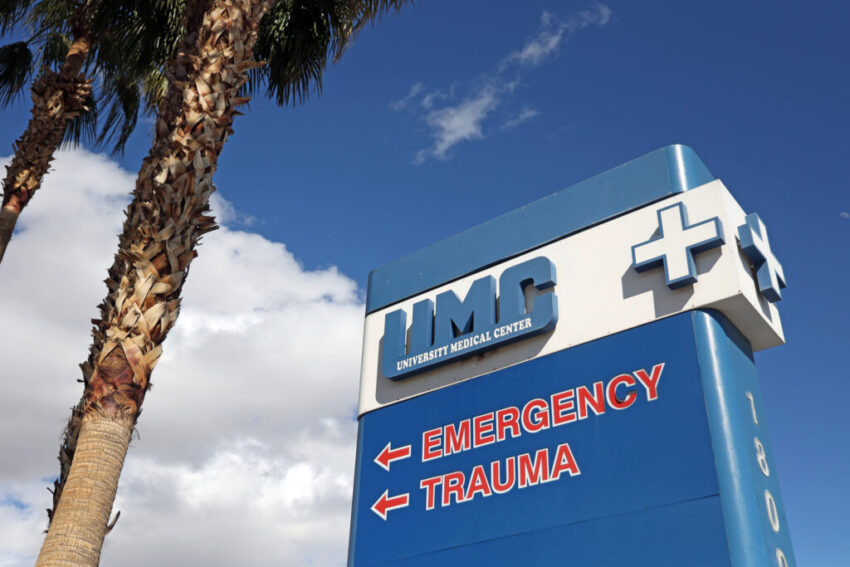Only three states – Wyoming, Idaho, and Mississippi – have fewer doctors per 100,000 population than Nevada. (Photo: Ronda Churchill for Nevada Current)
Democratic Sen. Catherine Cortez Masto is warning Nevadans that President Donald Trump’s spending and tax cut bill will ripple through every aspect of the state’s health care system, going far beyond those who directly rely on Medicaid.
Hospitals are already assessing whether they may need to cut staff or reduce services, said Cortez Masto during a Wednesday virtual roundtable with representatives from University Medical Center, Nevada Hospital Association, and Northern Nevada HOPES to discuss the legislation.
They all agreed such cuts would have a cascading effect on anyone needing medical treatment.
Lee derides Big Beautiful Bill’s Medicaid cuts: ‘People will lose their health care’
That is on top of the direct impact of the proposed Medicaid cuts, which providers have warned will result in delayed care, lost access to lifesaving medical treatments and possible closures of facilities.
“It is going to devastate health care in Nevada,” Cortez Masto said.
The House is expected to vote on the amended version of “Big Beautiful Bill,” which narrowly passed the Senate on Tuesday. Cortez Masto and the entire Senate Democratic caucus voted against the bill, as did three Republican senators.
Among the GOP-backed megabill’s various provisions are $930 billion in cuts to Medicaid over the next 10 years.
“All of this is happening so that Republicans and President Trump can pay for billions of dollars in tax giveaways for the wealthiest Americans,” Cortez Masto said.
The legislation is estimated to kick around 17 million Americans off Medicaid or Affordable Care Act coverage, with about 114,500 Nevadans at risk of losing their health care, she said.
Among the nearly 738,000 enrolled in Medicaid in Nevada, 39% are children and 15% have chronic conditions, according to KFF.
Nevada has a long history of low Medicaid reimbursement rates for healthcare providers.
Republicans target a tax that keeps state Medicaid programs running
In 2023, Nevada’s private hospitals agreed to pay what’s known as a “provider tax” that funds Medicaid and helps the state access additional federal matching dollars.
The current rate brings Nevada around $830 million each year.
That would change if the bill is passed. According to Nevada Hospital Association President Pat Kelly, payment amounts would be reduced “by about 30%, starting in 2028,” resulting in a reduction of around $618 million in funding annually.
“When you get to this low level, the program may need to be terminated by about January 1, 2030 to avoid major cash flow risks for our acute care hospitals,” Kelly said. “We agreed to pay 15% of the provider fee money to support behavioral health care services, and that will get cut as well.”
Because of many last-minute changes to the bill that were introduced in a 27-hour voting session, Kelly said the association is still assessing just “how devastating the impact is going to be to the provider fee program.”
Beatrice Nortey, a pediatric nurse who relies on Medicaid to treat her sickle cell disease, said these cuts go beyond numbers.
Many of the children in her care rely on Medicaid to pay for the oxygen tanks, suction tubes, and mobility devices.
These “items that aren’t optional but necessary to keep them alive and out of the hospital,” she said. “When Medicaid is cut, these children face delays or denials in getting equipment they need, which can lead to unnecessary suffering, emergency room visits and even death.”
‘Ultimately gets paid by taxpayers’
Nevada has long faced a shortage of health care providers and consistently “ranks near the bottom nationally for primary care doctors and mental health care professionals per capita,” said Dr. Ketan Patel, the medical director of UMC.
The bill, he said, would make those deficits even more pronounced.
“When Medicaid gets cut, reimbursement rates drop,” Patel said. “That drives even more doctors to opt out of seeing these patients entirely.”
Jennifer Wakem, the CFO of UMC, said around 42% of patients that come in for inpatient care rely on Medicaid.
“To stay afloat financially, it would mean we potentially would cut services offered,” Wakem said. “If we chose not to go down that path, we would likely reach out to” Clark County “for additional subsidies to keep UMC open. That, of course, ultimately gets paid by taxpayers.”
The bill will likely hurt people who use private insurance.
In a strained health system, those individuals would likely see premiums and out-of-pocket costs soar, Cortez Masto said, adding that Nevadans receiving coverage through the Affordable Care Act “could see premiums rise by $705 per year.”
“More people now are going to be showing up in our emergency rooms with acute care because they now have lost the health care that they need to even provide preventative care for them,” she said.
Click this link for the original source of this article.
Author: Michael Lyle
This content is courtesy of, and owned and copyrighted by, https://www.nevadacurrent.com and its author. This content is made available by use of the public RSS feed offered by the host site and is used for educational purposes only. If you are the author or represent the host site and would like this content removed now and in the future, please contact USSANews.com using the email address in the Contact page found in the website menu.








